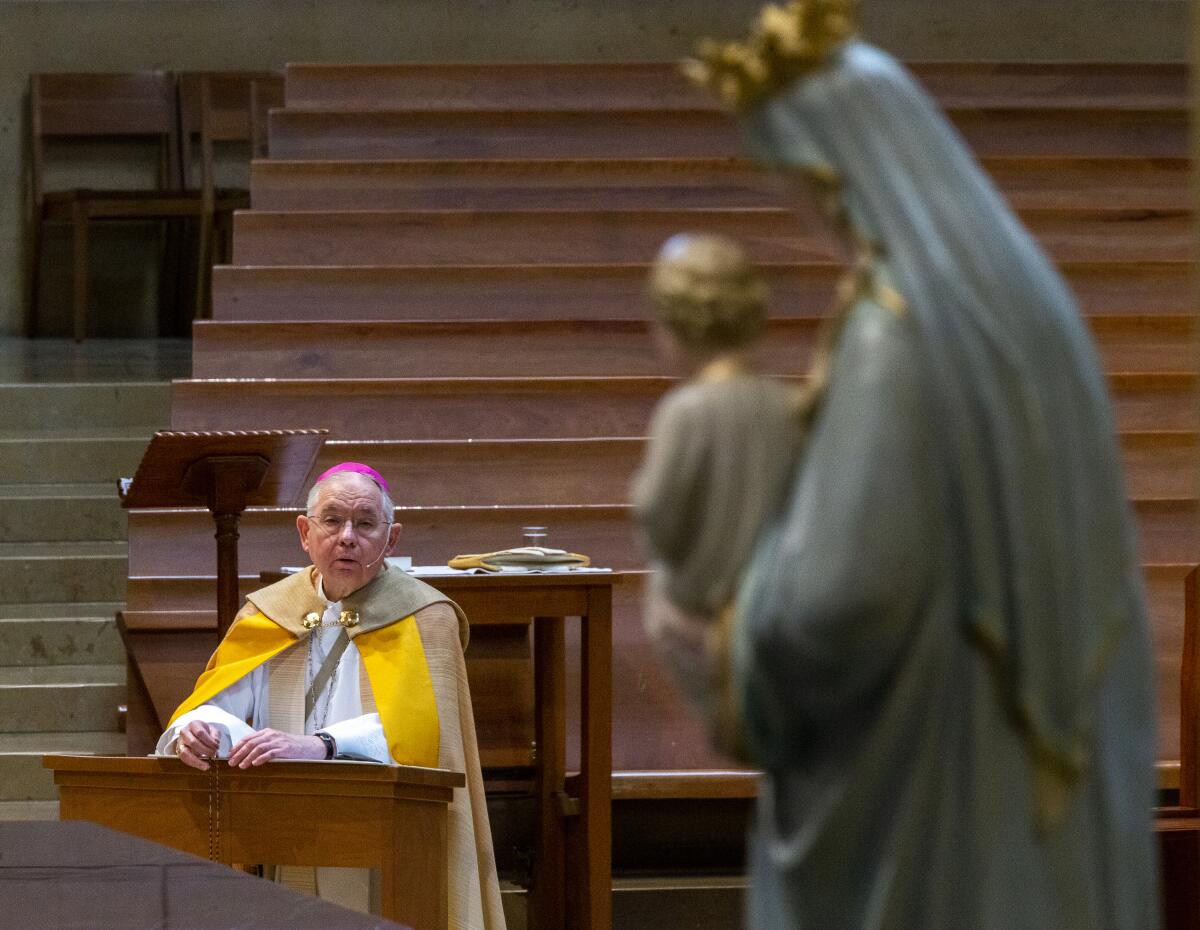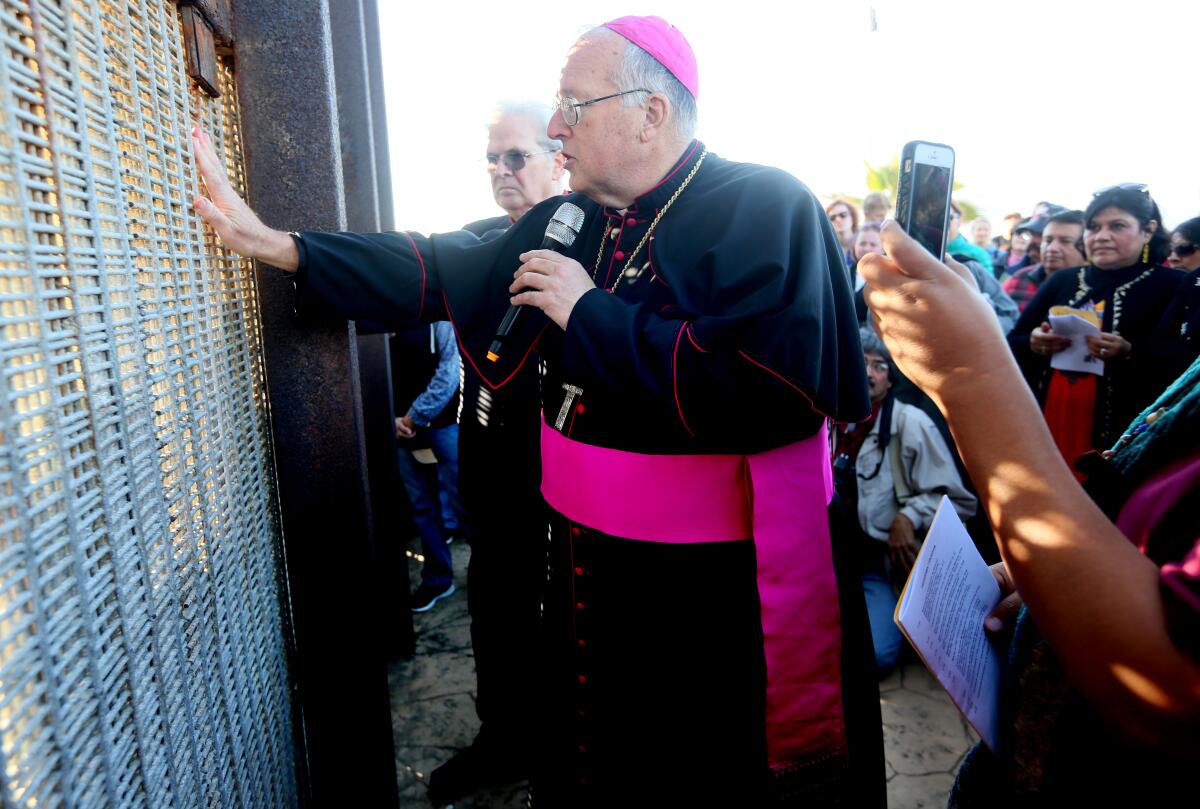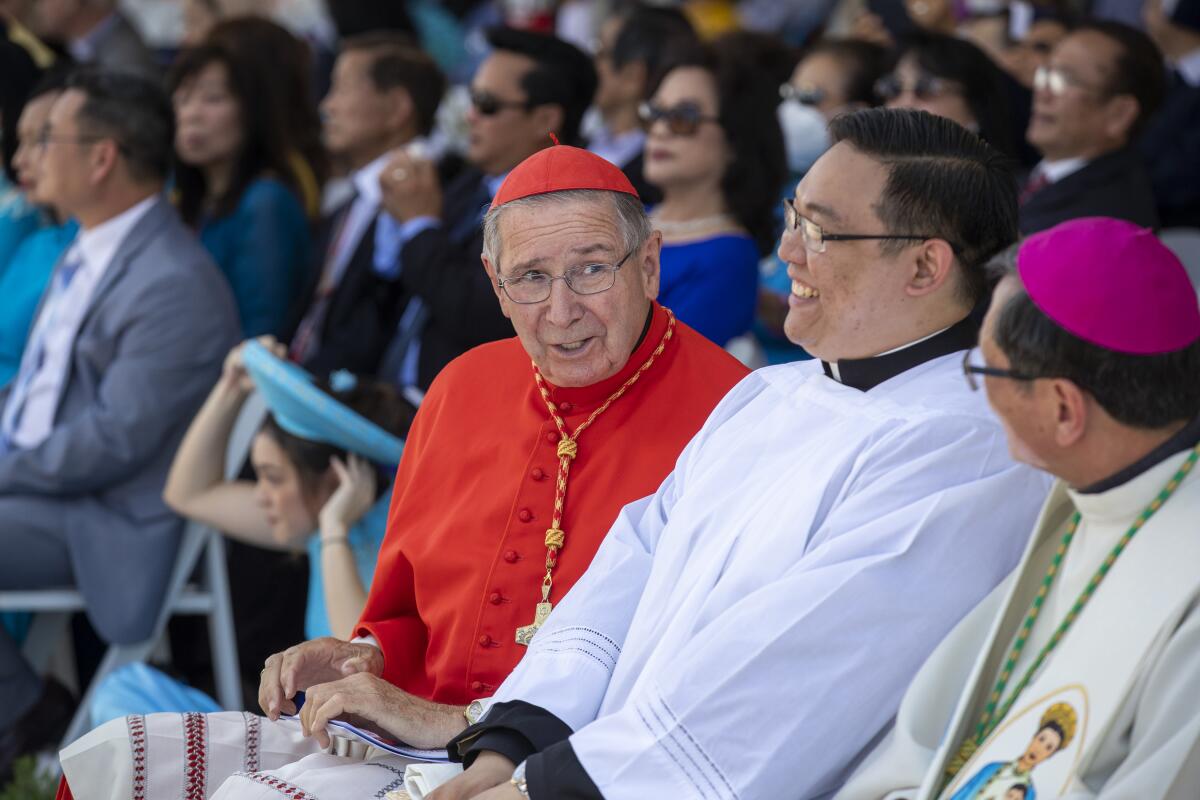Pope Francis hasn’t yet made L.A. Archbishop José Gomez a cardinal. Blame Gomez

- Share via
Colorful Korean hanboks and ornate Polish vests. Aztec headdresses and Nigerian head wraps. Skirts designed to look like the blue-and-white flags of Central American countries. Samoan prints and charro suits.
Last Saturday, many at the Cathedral of Our Lady of the Angels in downtown Los Angeles came dressed to impress in their ethnic best.
They were there for a special afternoon Mass titled “One Mother, Many Peoples,” held to celebrate the dazzling diversity of Catholic L.A. A livestream showed participants marching down the center aisle of the cavernous house of worship behind a banner that read, “Office of Ethnic Ministry.”
At the very back of the procession was Archbishop José H. Gomez.
It was a beautiful display of faith, worthy of being attended by thousands. Yet the pews were nowhere near half full.
An interview with Archbishop Jose Gomez
Gomez continued the multicultural theme in his homily, noting that Catholicism in Southern California was born from encounters between Spaniards and Native Americans (although the soft-spoken prelate’s description of the interaction between Franciscan missionaries and the Tongva people at Mission San Gabriel as a “fruitful collaboration” was a bizarre — and wrong — interpretation of history).
He then riffed on the Gospel story of the Virgin Mary accepting God’s plans to make her the mother of Jesus Christ. “[She] decides to place her life in the service in the plan of God,” he told the crowd, before reciting Mary’s famous quote on the matter: “It be done to me, according to your word.”
The story — known as the Annunciation — is used as a lesson to accept your fate when higher powers decide it for you. As I watched Gomez tell it, I thought he could’ve just as easily been talking about himself.
Hours earlier, halfway around the globe, Pope Francis held an installation ceremony at St. Peter’s Basilica in the Vatican for 20 new cardinals. Among them was Robert W. McElroy, the longtime bishop of the Diocese of San Diego.
Gomez is one of the most powerful Catholics in the United States: president of the U.S. Conference of Catholic Bishops, leader of the country’s largest diocese, a prominent voice in defense of immigrants and refugees worldwide. He has served as an archbishop in San Antonio and then Los Angeles for 17 years, one of the longest current reigns in American Catholicism.
So when Pope Francis — who calls social justice activists “poets” and frequently inveighs against “economic elites” — picked McElroy over Gomez as the only West Coast-based cardinal, it sparked glee or gloom among Catholics, depending on one’s politics.

The liberal-minded National Catholic Reporter called Gomez a “failed culture warrior” for his work heading the U.S. Conference of Catholic Bishops.
“In an organization whose history is peppered with failed leaders, it is hard to find one less accomplished,” the newspaper said.
On the right, Father Thomas G. Weinandy, a columnist for conservative Catholic publications, described the papal snub of Gomez as a politically motivated “insult.”
“It is precisely [Gomez’s] loyalty to the Church’s perennial teaching, especially with regards to its moral teaching, that disqualifies [him] from Francis’consideration,” Weinandy wrote.
For me, Pope Francis’ decision to pass over Gomez was just sad.
As I wrote in a column last year, Catholics like me want a holy man who inspires, who embodies our good but also joins us in fighting the bad. We deserve a local leader with a spot in the highest echelons of the Vatican, because we are a world capital with millions of faithful who embody the future of the Catholic Church.
Instead of rising to this responsibility, Gomez — L.A.’s first archbishop of Mexican descent — has shirked it by paying more attention to the political than the pastoral.
Before the inauguration of Joe Biden in 2021, Gomez offered prayers to the incoming president, then blasted him. Biden’s support of the right to abortion, gay marriage, gender fluidity and employer-funded contraception amounted to “moral evils” that “threaten human life and dignity,” he said.
In November, Gomez trashed “woke” culture as “profoundly atheistic ... pseudo religions.” He has shunned the Los Angeles chapter of the Catholic Worker, the progressive lay movement long involved in issues on society’s mind these days, from homelessness to police brutality to anti-racism. Polls consistently show that more Catholics support abortion rights than not, yet Gomez led an attempt by some bishops to deny Communion to any Catholic politician who voted for a woman’s right to choose.
These moves make Gomez popular among the Catholic right, which is well-funded, ascendant and counts a super-majority of Supreme Court justices as fellow travelers. But such orthodoxy does nothing to address what’s happening on the ground in Los Angeles, and it’s the antithesis of Pope Francis, who has advocated that the princes of the church “be shepherds with the smell of sheep” — that is, be among their flock instead of staying in the stable.
Gomez congratulated McElroy on his promotion, stating, “His strong faith and the pastoral concern for the faithful he has shown in his diocese will serve the global Church well.”
If Gomez is disappointed at his lack of a cardinal’s red cassock, he’s not saying it publicly. But Pope Francis has now held eight consistories — gatherings of cardinals — to create new ones over the last nine years, and Gomez hasn’t even been whispered about as a contender. It’s embarrassing for Los Angeles — and it’s all Gomez’s own doing.
The Archdiocese of Los Angeles never responded to my repeated requests for comment.
No one knows why Pope Francis has yet to elevate Gomez. But he’s the first head of the L.A. archdiocese not to become cardinal since Archbishop John Joseph Cantwell died back in 1947 after leading Southern California’s Catholics for 30 years.
That means Gomez has also forsaken the historical role of L.A. cardinals as reflections of Southern California and as leaders of American Catholicism.

When James Francis McIntyre became cardinal in 1953, his focus on opening churches and schools, along with his reactionary politics and cozying up to the city’s elite, mirrored L.A.’s suburban dreams. When Timothy Manning was elevated to the position in 1973, he presided over a city that was taking stock of a future it knew would be different. In 1991, Roger Mahony’s ascendancy signified an affirmation of a city that was more comfortable with its diverse, working-class communities.
Gomez offers no such metaphors.
At a weekday Mass several weeks ago, Our Lady of the Angels was more packed than usual — but that still meant the place was half full. Catholics from across California had come to see a relic of St. Bernadette, the patron saint of illness and those ridiculed for their religion.
So many showed up — it was the first time the relic had been shown in the U.S. — that security asked attendees to sit in the pews, because there was still a service to hold.
Gomez spent most of the Mass on his bishop’s throne, offering some unmemorable words toward the end. Afterward, the faithful waited for a chance to see the holy relic, in a line that spanned the length of the cathedral.
They paid no attention to the archbishop.
More to Read
Sign up for Essential California
The most important California stories and recommendations in your inbox every morning.
You may occasionally receive promotional content from the Los Angeles Times.











